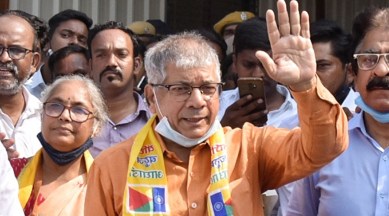Stay updated with the latest - Click here to follow us on Instagram
VBA will become voice of poor, struggling Marathas seeking reservation: Prakash Ambedkar
Prakash Ambedkar says the Vanchit Bahujan Aghadi is the right party to raise the concerns of the struggling Marathas and ensure they get justice.

Vanchit Bahujan Aghadi (VBA) president Prakash Ambedkar, the grandson of Dr B R Ambedkar, has embarked on an ambitious plan to expand the organisation’s scope by reaching out to poor Marathas. In an interview with The Indian Express, he talks about his politics and the chasm between the haves and the have-nots within the Marathas.
Prakash Ambedkar: Vanchit Bahujan Aghadi has taken the initiative to unite all like-minded, non-BJP parties to form a united front. Unfortunately, despite writing letters, we have not received any response from established mainstream parties like the Congress. So, the VBA is prepared to contest all 48 Lok Sabha seats alone.
Q. Are you banking on Other Backward Classes (OBC), Dalit votes?
Ambedkar: From the beginning, we have clarified that the VBA is for all oppressed, backward and deprived segments, cutting across caste, community and religion. Yes, we will reach out to Dalits, OBCs, minorities, and poor and struggling Marathas. Any community or class which believes it has been subjected to injustice is welcome in our organisation. We will fight for them.
Q. Why are you reaching out to Marathas?
Ambedkar: As our party’s title suggests, a sizeable section of the Marathas is reeling under poverty and illiteracy. They are financially weak. They have no sustainable means of livelihood. Such segments are utterly disillusioned with the mainstream political parties and established leadership. These oppressed and poor Marathas seek an alternative beyond the Congress, Nationalist Congress Party (NCP) and the BJP. The VBA is the right party which can at least raise their concerns and ensure they get justice.
Q. But VBA does not have MLAs, MPs or ministers. How do you see that?
Ambedkar: The VBA’s real objective is never electoral politics. But our support base is big enough to raise the voice against injustice and make those at the helm take note. In the past, we have shown our might by taking to the streets. We don’t have to prove anything to anyone.
Q. But there are influential established Maratha leaders. So, what is the significance of the VBA among the Marathas?
Ambedkar: Yes. There is no shortage of Maratha leaders in Maharashtra. But then the question is why despite political dominance and economic empowerment, the majority within the community are reeling in poverty and unemployment, and lagging in education. Who is responsible?
The Marathas should be divided into two classes — one small segment which is rich and powerful. And the other majority which is struggling. I refer to the rich and powerful as Nizam Marathas and the struggling class as Rayat Marathas. Incidentally, this poor, lower-middle, struggling-class Rayat Marathas served the great warrior king Chhatrapati Shivaji Maharaj.
Q. Don’t you think the strong Maratha leadership gave an inclusive development model to Maharashtra?
Ambedkar: Yes, we can say so. But it was during the regime of Maharashtra’s first chief minister Yashwantrao Chavan to that of chief minister Vasantdada Patil. The ruling class continuously strived for the upliftment of the struggling masses. Every policy and programme aimed to empower Bahujan (oppressed/backward/ religious minorities).
But as I said, it was limited to a handful of chief ministers between the 1960s and 1980s. But later, those at the helm failed their community. While individual Maratha politicians have become prosperous and powerful, the majority was left behind. The gap between rich and poor Marathas has grown over the decades.
Q. Is the Maratha reservation demand a fallout of economic backwardness within the community?
Ambedkar: Socially, the Marathas have never faced discrimination based on caste or community. Almost 73 per cent of Marathas were engaged in agriculture activities. Over the decades, individual landholding shrunk, and losses multiplied, making agriculture no longer sustainable.
This resulted in farm suicides and poverty. When agriculture was driven by market forces instead of state government control and support, the rural economy took a major beating, and farmers were adversely hit. Poverty and unemployment badly affected these toiling classes within Marathas. And they believe reservation is the only solution to their problems.
Q. Will the Maratha reservation withstand the legal and constitutional test?
Ambedkar: Why not? Of course, it will, provided they divide the community into two segments — affluent and struggling. Once proved, Their social backwardness and economic and educational situation will help them qualify for reservation.
Marathas should get reservations under a separate category. The OBC reservation should remain untouched. Maratha activist Manoj Jarange-Patil has given 40 days to the government. But then, I wonder why the state government cannot resolve the matter.
Q. Is the Maratha reservation such a complex issue?
Ambedkar: If there is a political will, nothing can stop them from finding a lasting solution to the Maratha reservation. But my fear is some people want to keep Maratha and OBC reservations on a boil as that leads to polarisation and helps them gain political mileage.
Q. Are you hinting at the BJP?
Ambedkar: I am not accusing any one party or its leaders. If all political parties and their leaders favour the Maratha reservation, what stops them from finding a solution?